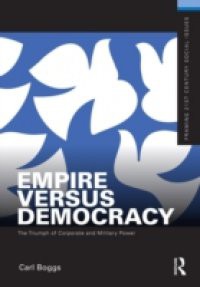In Empire Versus Democracy, Carl Boggs traces the authoritarian trajectory of American politics since World War II, with emphasis on the growing concentration of corporate and military power that has accompanied the United States assumption of leading superpower on the world scene. The rise of the U.S. as unchallenged imperial nation has meant the steady expansion of a permanent war economy and security state that, working in tandem with large business interests, has led to proliferation of American armed-forces bases around the world, recurrent military interventions, swollen government bureaucracy, massive public expenditures, heavy reliance on surveillance and secrecy, and diminished resources for social infrastructure and social programs. Boggs shows that, as in the case of the Roman and other previous empires, enlargement of U.S. imperial power has resulted in a decline of civic engagement and local participation along with skewed priorities favoring the war economy and security state. Inevitably, this has meant a weakening of electoral and legislative politics, overwhelmed by the centers of enormous wealth and power. The goal of this new, unique Series is to offer readable, teachable "thinking frames" on today's social problems and social issues by leading scholars, all in short 60 page or shorter formats, and available for view on http://routledge.customgateway.com/routledge-social-issues.html For instructors teaching a wide range of courses in the social sciences, the Routledge Social Issues Collection now offers the best of both worlds: originally written short texts that provide "overviews" to important social issues as well as teachable excerpts from larger works previously published by Routledge and other presses.

